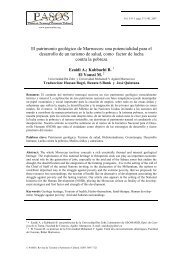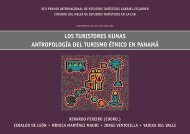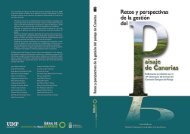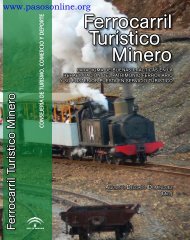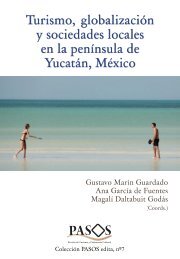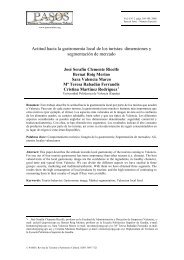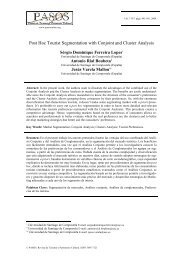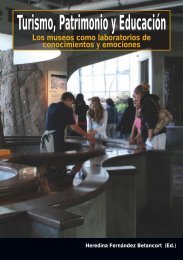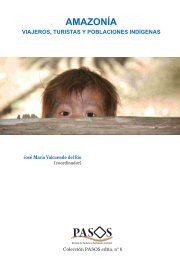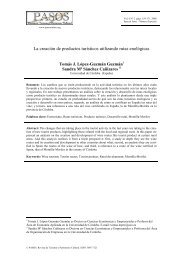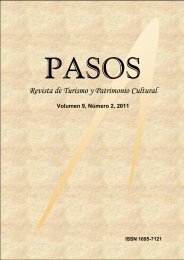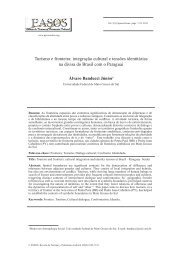Full Journal - Pasos
Full Journal - Pasos
Full Journal - Pasos
Create successful ePaper yourself
Turn your PDF publications into a flip-book with our unique Google optimized e-Paper software.
Josep-Francesc Valls; Silvia Banchini; Luis Falcón; Gerard Valls Tuñon 97<br />
• Tourism should remain the city’s economic<br />
mainstay, which in these times of crisis, drives<br />
development<br />
• Tourism differentiation should help Barcelona<br />
lead in innovative activities:<br />
––<br />
Treating city tourism as something that<br />
creates tourist experiences; creating value<br />
through brands; seeking solutions to problems<br />
of sustainability; adopting intensive<br />
online marketing and sales channels, and<br />
new technology for managing city tourism;<br />
creating new business models; organisational<br />
integration and flexibility to gain in<br />
scale and global reach; ongoing cost-cutting<br />
through effective management and control<br />
of risks.<br />
––<br />
At the city level—and linked to R&D plus<br />
innovation—technology transfer: creating<br />
innovative companies and human capital;<br />
fostering integration between training, research<br />
and production.<br />
• A better balance needs to be struck between<br />
residents and tourists in the use of public<br />
space. This balance will avoid both the maintenance<br />
and emergence of segregated tourist<br />
districts (van den Berger, 2000). The idea is<br />
to ease the burden on the ‘central recreational<br />
districts’ (Carlino and Saíz, 2008) by spreading<br />
tourists to other city neighbourhoods, the<br />
metropolitan area and the rest of Catalonia:<br />
improving communications and inter-modal<br />
transport—two of Barcelona’s weakest points<br />
at the international level.<br />
• The indiscriminate pursuit of ever higher visitor<br />
and tourist numbers ought to be ended.<br />
Sustainability should be achieved by fostering<br />
the city’s intrinsic values: culture and architectural<br />
heritage; lifestyle; cultural industries;<br />
beliefs; gastronomy; fashion; language;<br />
folklore; Barcelona as capital of Catalonia.<br />
The combination of these elements creates<br />
a brand image of an attractive city, turning<br />
experience into the central plank of a new<br />
model: the selection of clients and value.<br />
• Ongoing innovation in the tourism field requires<br />
a constant stream of money to turn the city<br />
into a stable attraction. A tourism tax is an<br />
essential, balancing element for those cities that<br />
have yet to adopt it. The most modern systems<br />
for levying the tax use Public-Private Partnerships<br />
(PPP) on the lines of Business Improvement<br />
Districts (BID) (Valls, Vila, 2004)<br />
Enhancing the city’s competitiveness means<br />
planning based on the three aspects mentioned<br />
earlier, namely: sustainability; integrated management<br />
and governance; client orientation.<br />
3.1. Sustainability<br />
Addressing the three aspects just mentioned<br />
involves: fostering the city’s ability to reinvent<br />
itself (in terms of products, management models<br />
and technology); guaranteeing long-term viability<br />
by introducing a tax to make tourists bear<br />
a fair share of the financial burden. If the tax<br />
is not collected through hotel stays, another<br />
solution would be to levy it through the publicprivately<br />
managed BID. Here one should not the<br />
success of this approach adopted by The Barcelona<br />
Tourist Board.<br />
3.2. Integrated management and governance<br />
Developing tourist products requires the<br />
following infrastructure and facilities:<br />
––<br />
Control over the carrying capacity of monuments<br />
and streets<br />
––<br />
Transport<br />
––<br />
Inter-modal transport connections<br />
––<br />
Varied transport options<br />
––<br />
Signposting<br />
––<br />
Security<br />
––<br />
Cleanliness<br />
––<br />
Hospitality<br />
––<br />
Information<br />
––<br />
Talent and innovation<br />
and the following services:<br />
––<br />
Shopping<br />
––<br />
Gastronomy<br />
––<br />
Lodging<br />
––<br />
Day and night life<br />
––<br />
Suitable opening hours<br />
––<br />
Guided visits<br />
With regard to governance, there are various<br />
hurdles that need to be overcome to make the<br />
city more competitive. The Barcelona Tourist<br />
Board, which currently does little else but promote<br />
the city’s brand image, should have its<br />
management remit extended to other fields of<br />
governance such as: creating tourist products;<br />
city technologies and logistics; planning the<br />
human capital needed; co-ordinating tourism<br />
with the city’s other economic activities; shaping<br />
general planning of the city and of investments,<br />
given that tourism is a key economic activity.<br />
3.3. Client orientation<br />
The tourism model based on indiscriminately<br />
attracting tourists to the city worked well in the<br />
early stages of Barcelona’s international expansion.<br />
However, the quest should now be to seek<br />
PASOS. Revista de Turismo y Patrimonio Cultural, 11(1). 2013 ISSN 1695-7121



